法律英语练习题
法律英语试题(2套)
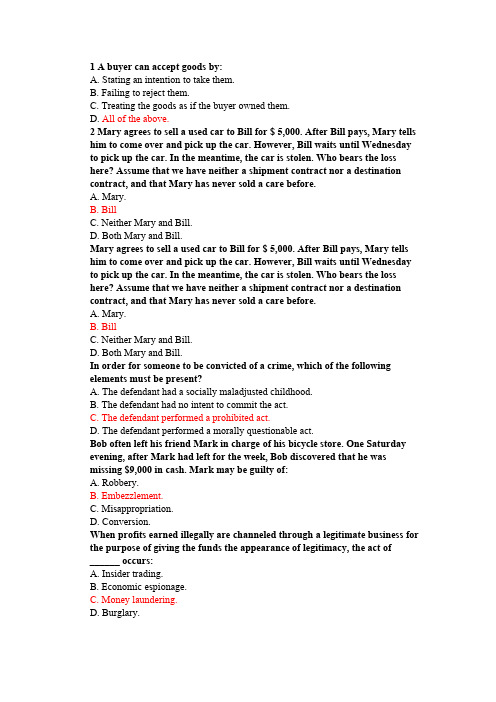
1 A buyer can accept goods by:A. Stating an intention to take them.B. Failing to reject them.C. Treating the goods as if the buyer owned them.D. All of the above.2 Mary agrees to sell a used car to Bill for $ 5,000. After Bill pays, Mary tells him to come over and pick up the car. However, Bill waits until Wednesday to pick up the car. In the meantime, the car is stolen. Who bears the loss here? Assume that we have neither a shipment contract nor a destination contract, and that Mary has never sold a care before.A. Mary.B. BillC. Neither Mary and Bill.D. Both Mary and Bill.Mary agrees to sell a used car to Bill for $ 5,000. After Bill pays, Mary tells him to come over and pick up the car. However, Bill waits until Wednesday to pick up the car. In the meantime, the car is stolen. Who bears the loss here? Assume that we have neither a shipment contract nor a destination contract, and that Mary has never sold a care before.A. Mary.B. BillC. Neither Mary and Bill.D. Both Mary and Bill.In order for someone to be convicted of a crime, which of the following elements must be present?A. The defendant had a socially maladjusted childhood.B. The defendant had no intent to commit the act.C. The defendant performed a prohibited act.D. The defendant performed a morally questionable act.Bob often left his friend Mark in charge of his bicycle store. One Saturday evening, after Mark had left for the week, Bob discovered that he was missing $9,000 in cash. Mark may be guilty of:A. Robbery.B. Embezzlement.C. Misappropriation.D. Conversion.When profits earned illegally are channeled through a legitimate business for the purpose of giving the funds the appearance of legitimacy, the act of______ occurs:A. Insider trading.B. Economic espionage.C. Money laundering.D. Burglary.When profits earned illegally are channeled through a legitimate business for the purpose of giving the funds the appearance of legitimacy, the act of______ occurs:A. Insider trading.B. Economic espionage.C. Money laundering.D. Burglary.If James takes Ellen’s diamond-studded watch from her desk at work while Ellen is at lunch and does not return it, he may be guilty of the crime of:A. Battery.B. Larceny.C. Arson.D. ForgeryA homicide committed without malice towards the victim is known as:A. First-degree murder.B. Manslaughter.C. A misdemeanor.D. ExtortionIf you are charged with a crime, you might be able to defend yourself and escape liability if you:A. Committed a prohibited act.B. Were voluntarily intoxicated at the time of the crime.C. Were over the age of sixty-five at the time of crime.D. Were involuntarily intoxicated at the time of crime.One morning in the Laundromat, Duneberry approached Kirksey and said, “If you don’t pay me $ 500 by July 2nd, I’ll beat you to a pulp.” A week later, on July 2nd, Duneberry met Kirksey at a local bar and demanded the money. Kirksey handed Duneberry the $ 500. After receiving the money, Duneberry then punched Kirksey in the stomach and hurriedly left the bar. Under modern statutory law, Duneberry will most likely be found guilty of which of the following crimes:A. Extortion and battery.B. Extortion and robbery.C. Assault and battery.D. Assault and robberyWhich of the following does NOT describe a felony?A. If found guilty, you are sentenced to prison for up to six months.B. If found guilty, you go to a federal or state penitentiary.C. If found guilty, you may face the death penalty.D. If found guilty, you may face life imprisonment.Which of the following is not classified in English law as a tort?A. Defamation.B. Negligence.C. Breach of contract.D. NuisanceEunice Younis is sitting in a swing chair watching her husband Yasser, planting tulip bulbs from his native Turkey. Jacques Kevorkian, who hates Yasser because of the Armenian genocide, but is a friend of Eunice’s, whose present is known to him, draws a scimitar and threatens to behead Yasser. Eunice, who is five months pregnant, suffers severe psychological trauma as a result of this spectacle and miscarries shortly thereafter. In an action by Eunice against Jacques for intentional inflection of emotional distress causing her miscarriage, Eunice will:A. Lose, because Jacques did not know Eunice was pregnant.B. Win, because it is highly probable that Jacques’ extreme and outrageous conduct would inflect emotional distress on Eunice.C. Lose, since Jacques’s tortuous acts were aimed against Yasser, so only Yasser can recover for emotional distress.D. Win, because she is Yasser’s wife.Intent is:A. A factor required to sustain a tort.B. Strict liability.C. The desire to cause a certain result or to act with substantial knowledge that an injury will result.D. Where desert nomads liveFalse imprisonment is:A. Placing a convicted defendant in a maximum security prison.B. A description of when a judge and jury disagree over a sentence.C. A criminal imprisonment for civil wrong.D. The intentional, unlawful confinement of a person against that person’s will.1. Which of the following is/are required in order to have a “tender” of goods?A. The seller must put and hold conforming goods at the buyer’s disposal.B. The seller must give notice to the buyer that the goods are available.C. The seller must give notice to the buyer and hold the goods for a reasonable time.D. All of the above are required for tender.2. Rescission may be defined as:A. The substitution of one contract party for another.B. The revision of a contract’s terms to reflect trade usage.C. The full performance of a contract.D. The unmaking of a contract to return the contract parties to the positions they were in before the contract was formed.3. Suppose that you purchase a purebred Scottish Terrier puppy. You pay $800 for the dog because it comes from champion stock. The dog’s owner did not discuss the dog’s pedigree with you. If you discover later that the dog is not worth $800, but only $400, can you have the contract rescinded or canceled based on your mistake?A. Yes, if the owner knew the dog was clearly not worth $800.B. Yes, because you had a duty to investigate.C. Probably not, because you made a mistake about the dog’s value, not a mistake of a material fact.D. Probably so, because you made a mistake of an immaterial fact.4. Liz contracts with Brian. Liz agrees to cook 20 dinners for Brian, in exchange for which Brian will repair all of the plumbing in Liz’s house. Is this consideration legally sufficient?A. No, because it is clear that one dinner is not worth as much as repairing all of the plumbing in Liz’s house.B. No, because this kind of bargain violates public policy.C. Yes, based on the clear lack of any bargain.D. Yes, because Liz has promised something of value5. Reggie Rugg owns the Spartacus He-Male Hair Augmentation Emporiun, an enterprise dedicated to selling wigs and toupees and providing hair-weaving services to balding men. Reggie’s most outstanding employee is Hortense Herrseut. One day upon which business has been unusually brisk, Reggie tells Hortense, “You have done really good lately. If you can keep it up until Christmas, you will get a $500 bonus.” Reggie’s promise could be best characterized as:A. Valid consideration.B. An illusory promise.C. An output contract.D. A requirements contract6. Eddy Malestrom is a wholesale seller of home whirlpool baths and Vercingetorix Voorteckx is a retailer of the same. The conclude an agreement for the purchase of 100 whirlpool bath sets for delivery on May 5th. Eddy duly delivers 99 sets on May 5th conforming in all particulars to contract specifications:A. Vercingetorix may not reject Eddy’s performance because Eddy has substantially performed.B. Vercingetorix may not reject Eddy’s performance unless Eddy’s breach was intentional.C. Vercingetorix may reject Eddy’s performance based on Eddy’s material breach.D. Vercingetorix may reject Eddy’s performance because it was not precisely what their agreement demanded7. Andronicus, an international dog dealer, offers to pay Justinian, an professional dog breeder, $40,00 on August 12th to buy Justinian’s Tibetan mastiff “Gyastso”, to be delivered on July 12th that year. Justinian delivers the dog to Andronicus on July 12th. On August 1st, Andronicus repudiates. Justinian’s cause of action against Andronicus will accrue:A. Immediately on August 1st.B. Anytime between July 12th and August 12th.C. Either A and B.D. August 12th8. With regard to corporations:A. They may be held liable for crimes, just as individuals may be.B. They may never be held liable for crimes.C. They do not really exist, so they cannot be liable for crimes, only for torts.D. They may only be held liable for crimes if they are privately owned.9. A person may be found not guilty of committing a crime if that person:A. Is over the age of 18.B. Suffers from a mental disease and lacks substantial capacity to appreciate the wrongfulness of his or her acts.C. Is voluntarily intoxicated.D. Made a mistake of law10. Negligence is:A. Forgetfulness.B. Willful and wanton misconduct.C. An intentional tort that can be brought for “wrongful birth” or for “wrongful death.”D. A tort that will impose liability for a breath of a duty that proximately causes an injury11. Immunity is:A. A statutory defense available only to sovereign governments.B. A possible defense to tort liability.C. The right of students in law school to participate in political demonstrations.D. The invulnerability of a trial court judge.12. Kriekor leases an apartment from Methuselah. In this situation, Methuselah is known as:A. The lessor.B. The lessee.C. The tenant.D. The debtor.13. The famous “swoosh” design on the side of NIKE sneakers is an example of:A. A copyright.B. A patent.C. A trademark.D. A trade secret14. When you see on a box of low-fat granola that the cereal has the “Good Housekeeping Seal of Approval”, you are looking at:A. A certification mark.B. A strong mark.C. A patent.D. A licensor15. Suppose that Jami invents and patents his new weeding machine, but never sells it. Louisa borrows the machine from Jami, pulls it apart, copies it, and then sells it. Louisa:A. Has done nothing wrong; competition is a part of our market economy.B. Has not infringed a patent because the product was not “in commerce.”C. Has infringed Jami’s patent rights.D. Has behaved immorally, but not illegally16. One of the ways to make use of another’s trademark, copyright, patent, or trade secret, while avoiding litigation, is to obtain:A. A cyber mark.B. A business process patent.C. An easement. 地役权D. A license.。
法律英语练习题答案
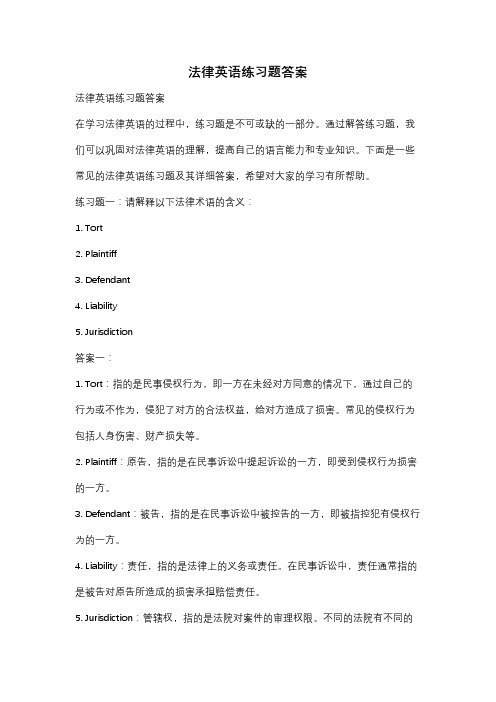
法律英语练习题答案法律英语练习题答案在学习法律英语的过程中,练习题是不可或缺的一部分。
通过解答练习题,我们可以巩固对法律英语的理解,提高自己的语言能力和专业知识。
下面是一些常见的法律英语练习题及其详细答案,希望对大家的学习有所帮助。
练习题一:请解释以下法律术语的含义:1. Tort2. Plaintiff3. Defendant4. Liability5. Jurisdiction答案一:1. Tort:指的是民事侵权行为,即一方在未经对方同意的情况下,通过自己的行为或不作为,侵犯了对方的合法权益,给对方造成了损害。
常见的侵权行为包括人身伤害、财产损失等。
2. Plaintiff:原告,指的是在民事诉讼中提起诉讼的一方,即受到侵权行为损害的一方。
3. Defendant:被告,指的是在民事诉讼中被控告的一方,即被指控犯有侵权行为的一方。
4. Liability:责任,指的是法律上的义务或责任。
在民事诉讼中,责任通常指的是被告对原告所造成的损害承担赔偿责任。
5. Jurisdiction:管辖权,指的是法院对案件的审理权限。
不同的法院有不同的管辖权,根据案件的性质、金额等因素来决定哪个法院有权审理该案件。
练习题二:请将以下英文法律名词翻译成中文:1. Contract2. Arbitration3. Injunction4. Intellectual property5. Negligence答案二:1. 合同2. 仲裁3. 禁令4. 知识产权5. 过失练习题三:请解释以下法律原则的含义:1. Presumption of innocence2. Due process3. Burden of proof4. Reasonable doubt5. Double jeopardy答案三:1. Presumption of innocence:无罪推定,指的是在刑事诉讼中,被告在未被证明有罪之前,应被认定为无罪。
法律英语练习题答案
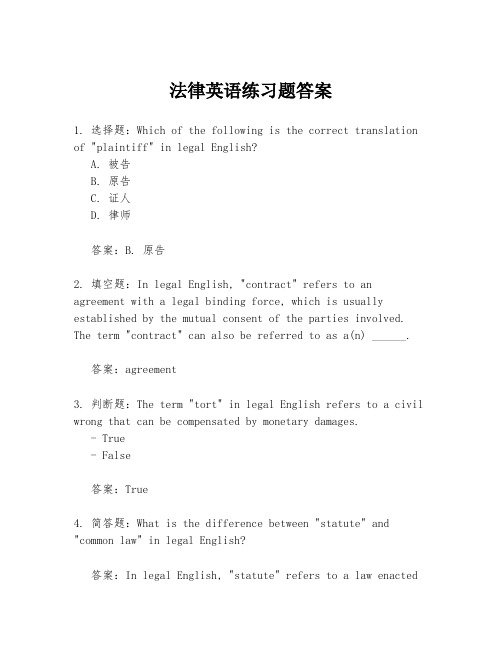
法律英语练习题答案1. 选择题:Which of the following is the correct translation of "plaintiff" in legal English?A. 被告B. 原告C. 证人D. 律师答案:B. 原告2. 填空题:In legal English, "contract" refers to an agreement with a legal binding force, which is usually established by the mutual consent of the parties involved. The term "contract" can also be referred to as a(n) ______.答案:agreement3. 判断题:The term "tort" in legal English refers to a civil wrong that can be compensated by monetary damages.- True- False答案:True4. 简答题:What is the difference between "statute" and "common law" in legal English?答案:In legal English, "statute" refers to a law enactedby a legislative body, whereas "common law" refers to the body of law derived from judicial decisions of courts and similar tribunals.5. 翻译题:请将以下句子翻译成英文。
法律英语模拟试题及答案

法律英语模拟试题及答案一、选择题(每题2分,共20分)1. Which of the following is NOT a fundamental principle of contract law?A. Offer and acceptanceB. ConsiderationC. Promissory estoppelD. Mistake of fact2. The term "tort" refers to:A. A breach of contractB. A civil wrongC. A criminal actD. A legal document3. In the context of criminal law, "actus reus" refers to:A. The guilty mindB. The criminal actC. The harm causedD. The punishment imposed4. Which of the following is a type of intellectual property?A. A patentB. A copyrightC. A trademarkD. All of the above5. "Jurisdiction" in legal terms means:A. The power to make a legal decisionB. The area over which the law appliesC. The process of suing someoneD. The legal profession6. A "fiduciary duty" is an obligation that arises when:A. A contract is breachedB. A crime is committedC. A trust is establishedD. A lawsuit is filed7. The doctrine of "res ipsa loquitur" is used to establish:A. The defendant's intentB. The plaintiff's negligenceC. The defendant's negligenceD. The plaintiff's damages8. "Precedent" in legal terms refers to:A. A previous legal decision that can be used to decide similar casesB. A legal principle that is universally acceptedC. A legal document that sets out the facts of a caseD. A legal argument that has been accepted by a court9. A "class action" is a lawsuit brought by:A. A single plaintiff on behalf of a group of peopleB. A group of plaintiffs on behalf of a single personC. A group of plaintiffs on behalf of themselves and othersD. A single plaintiff on behalf of themselves only10. "Probate" is the legal process of:A. Filing a lawsuitB. Administering an estate after deathC. Determining the validity of a willD. Both B and C二、填空题(每题1分,共10分)11. The legal term "_____" refers to the act of formally charging someone with a crime.12. A "_____" is a legal document that outlines the terms and conditions of an agreement between parties.13. "_____" is the legal principle that states that a person cannot be tried or punished twice for the same offense.14. "_____" is a legal remedy that requires the defendant to perform a specific act or to stop performing a certain act.15. "_____" is the process by which a person is released from prison before the end of their sentence, usually under supervision.16. "_____" refers to the legal responsibility to act primarily for the benefit of another person or entity.17. "_____" is a legal term for the right to use a public way for specific purposes, such as crossing another's land.18. "_____" is the legal principle that a person is innocent until proven guilty.19. "_____" is a legal document that provides evidence of a person's identity and citizenship.20. "_____" is the legal process of formally ending a marriage.三、简答题(每题5分,共30分)21. Define "due diligence" in the context of a legaltransaction.22. Explain the concept of "estoppel" in contract law.23. What is the difference between "assault" and "battery" in criminal law?24. Describe the purpose of a "non-compete agreement" in employment law.四、案例分析题(每题5分,共20分)25. John offers to sell his car to Mary for $10,000. Mary agrees to buy the car but later discovers that the car has a serious engine problem that John knew about but did not disclose. Analyze the situation using the principles of contract law.26. Alice is walking her dog in a public park. A stranger, Bob, suddenly throws a rock at the dog, causing it to run away. Alice sues Bob for the emotional distress she suffered as a result. Discuss the legal issues involved in this case.27. Company X is accused of patent infringement by Company Y. Company X claims that they were not aware of the patent and had conducted a thorough search before developing their product. What legal defense might Company X use?28. Jane is a minor who signed a contract with a company to star in a television show. Later, Jane decides she does not want to participate and wants to void the contract. Whatlegal considerations might apply to Jane's situation?五、论述题(每题15。
法律专业英语试题及答案

法律专业英语试题及答案一、选择题(每题1分,共10分)1. Which of the following is a fundamental principle of the legal system?A. EqualityB. JusticeC. FairnessD. All of the above2. The term "judiciary" refers to:A. The legislative branch of governmentB. The executive branch of governmentC. The branch of government responsible for interpreting and applying the lawD. The branch of government responsible for enforcing laws3. In the context of contract law, what is "consideration"?A. The thought process behind a contractB. The legal element that something of value is exchangedC. The written document of a contractD. The person who is bound by the contract4. What is the term for the legal principle that a person cannot be tried or punished twice for the same offense?A. Double jeopardyB. MitigationC. RecidivismD. Proportionality5. Which of the following is a type of legal document?A. DeedB. NovelC. MemoD. Invoice6. The term "pro se" means:A. Against oneselfB. On behalf of oneselfC. On behalf of anotherD. Against another7. What is the difference between "civil law" and "criminal law"?A. Civil law deals with disputes between individuals, while criminal law deals with offenses against the state.B. Criminal law deals with disputes between individuals, while civil law deals with offenses against the state.C. Both deal with offenses against the state.D. Both deal with disputes between individuals.8. What does the term "habeas corpus" mean?A. A writ requiring a person to be brought before a courtB. A legal document that ends a lawsuitC. A legal document that begins a lawsuitD. A writ that allows a person to be detained withouttrial9. In legal terms, "precedent" refers to:A. A legal principle or rule established in a previouscaseB. A legal document that is used as evidenceC. A legal principle that is always followed without exceptionD. A legal principle that is never followed10. What is the term for a legal dispute between two or more parties?A. LitigationB. MediationC. ArbitrationD. Negotiation二、填空题(每题1分,共5分)11. The legal principle of "innocent until proven guilty" is known as ________.12. A person who is not a lawyer but represents themselves in court is said to be acting ________.13. The process of a court determining the rights and obligations of parties in a dispute is called ________.14. A legal document that outlines the terms of a contract is known as a(n) ________.15. The area of law dealing with disputes over property is known as ________.三、简答题(每题5分,共10分)16. Explain the concept of "estoppel" in legal terms.17. What are the key differences between "common law" and "civil law" systems?四、案例分析题(每题15分,共15分)18. A company has been accused of breaching a contract with a supplier. The supplier claims that the company has failed to pay for goods delivered. The company argues that the goods were not delivered as per the agreed terms. Analyze the situation from a legal perspective, considering theprinciples of contract law.五、论述题(每题20分,共20分)19. Discuss the role of the judiciary in a democratic society and its importance in upholding the rule of law.答案:一、1. D2. C3. B4. A5. A6. B7. A8. A9. A10. A二、11. Presumption of innocence12. Pro se13. Adjudication14. Contract15. Property law三、16. Estoppel is a legal principle that prevents a person from asserting a claim or right that contradicts a previous position or statement they have made, especially when it would be unfair to allow them to do so.17. Common law systems rely heavily on judicial precedent, while civil law systems are based on comprehensive written codes. Common law is primarily developed through case law, whereas civil law is developed through legislative statutes.四、18. In this case, the supplier would need to provide evidence of the contract and proof of delivery of the goods. The company would need to show that the goods were not delivered according。
法律英语练习题
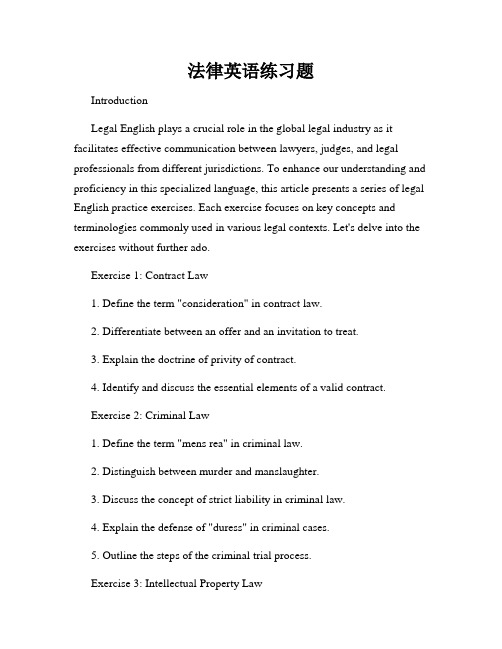
法律英语练习题IntroductionLegal English plays a crucial role in the global legal industry as it facilitates effective communication between lawyers, judges, and legal professionals from different jurisdictions. To enhance our understanding and proficiency in this specialized language, this article presents a series of legal English practice exercises. Each exercise focuses on key concepts and terminologies commonly used in various legal contexts. Let's delve into the exercises without further ado.Exercise 1: Contract Law1. Define the term "consideration" in contract law.2. Differentiate between an offer and an invitation to treat.3. Explain the doctrine of privity of contract.4. Identify and discuss the essential elements of a valid contract.Exercise 2: Criminal Law1. Define the term "mens rea" in criminal law.2. Distinguish between murder and manslaughter.3. Discuss the concept of strict liability in criminal law.4. Explain the defense of "duress" in criminal cases.5. Outline the steps of the criminal trial process.Exercise 3: Intellectual Property Law1. Explain the difference between copyright and trademark.2. Define the term "patent" in intellectual property law.3. Discuss the criteria for obtaining trademark protection.4. Identify and explain the rights granted by a copyright.Exercise 4: International Law1. Define the principle of state sovereignty in international law.2. Explain the concept of jus cogens.3. Discuss the role of the United Nations in international law.4. Describe the process of treaty formation and ratification.Exercise 5: Constitutional Law1. Define the term "separation of powers" in constitutional law.2. Explain the doctrine of judicial review.3. Discuss the protections provided by the First Amendment.4. Identify and describe the branches of government in a constitutional system.Exercise 6: Legal Research and Writing1. Explain the concept of legal precedent.2. Discuss the importance of legal citation in legal writing.3. Identify the components of a legal memorandum.4. Outline the steps of legal research.ConclusionMastering legal English is essential for anyone pursuing a career in the legal field. These practice exercises have provided a glimpse into various areas of law and enhanced our understanding of key legal concepts. By continually improving our legal language skills, we can effectively engage in cross-border legal communication and thrive in the global legal industry. Keep practicing and enhancing your legal English proficiency!。
九年级英语法律常识入门单选题50题
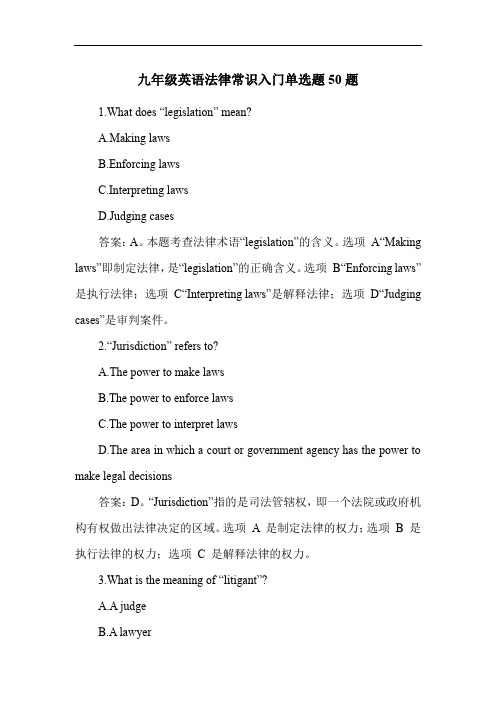
九年级英语法律常识入门单选题50题1.What does “legislation” mean?A.Making lawsB.Enforcing lawsC.Interpreting lawsD.Judging cases答案:A。
本题考查法律术语“legislation”的含义。
选项A“Making laws”即制定法律,是“legislation”的正确含义。
选项B“Enforcing laws”是执行法律;选项C“Interpreting laws”是解释法律;选项D“Judging cases”是审判案件。
2.“Jurisdiction” refers to?A.The power to make lawsB.The power to enforce lawsC.The power to interpret lawsD.The area in which a court or government agency has the power to make legal decisions答案:D。
“Jurisdiction”指的是司法管辖权,即一个法院或政府机构有权做出法律决定的区域。
选项A 是制定法律的权力;选项B 是执行法律的权力;选项C 是解释法律的权力。
3.What is the meaning of “litigant”?A.A judgeB.A lawyerC.A person involved in a lawsuitD.A lawmaker答案:C。
“litigant”是诉讼当事人的意思。
选项A 是法官;选项B 是律师;选项D 是立法者。
4.“Precedent” means?A.A new lawB.An old lawC.A legal decision that serves as an example for future casesD.A legal theory答案:C。
法律英语课后练习题含答案 (2)
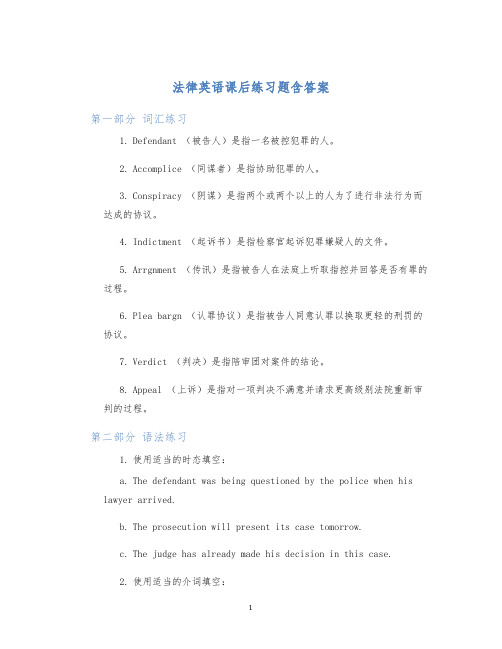
法律英语课后练习题含答案第一部分词汇练习1.Defendant (被告人)是指一名被控犯罪的人。
2.Accomplice (同谋者)是指协助犯罪的人。
3.Conspiracy (阴谋)是指两个或两个以上的人为了进行非法行为而达成的协议。
4.Indictment (起诉书)是指检察官起诉犯罪嫌疑人的文件。
5.Arrgnment (传讯)是指被告人在法庭上听取指控并回答是否有罪的过程。
6.Plea bargn (认罪协议)是指被告人同意认罪以换取更轻的刑罚的协议。
7.Verdict (判决)是指陪审团对案件的结论。
8.Appeal (上诉)是指对一项判决不满意并请求更高级别法院重新审判的过程。
第二部分语法练习1.使用适当的时态填空:a.The defendant was being questioned by the police when hislawyer arrived.b.The prosecution will present its case tomorrow.c.The judge has already made his decision in this case.2.使用适当的介词填空:a.The lawyer was confident in his client’s innocence.b.The defendant was charged with murder.c.The prosecution presented strong evidence agnst thedefendant.3.选择合适的词填空:a.The defense attorney argued that the prosecution did nothave ____ (sufficient / efficient) evidence to prove their case.b.The judge declared a ____ (mistrial / mistrust) due to jurymisconduct.c.The defendant decided to plead guilty in exchange for a ____(lighter / lighter) sentence.第三部分阅读理解For many years, a defendant’s right to a speedy trial has been an important part of the American legal system. This right is guaranteed by the Sixth Amendment to the Constitution, which states that。
- 1、下载文档前请自行甄别文档内容的完整性,平台不提供额外的编辑、内容补充、找答案等附加服务。
- 2、"仅部分预览"的文档,不可在线预览部分如存在完整性等问题,可反馈申请退款(可完整预览的文档不适用该条件!)。
- 3、如文档侵犯您的权益,请联系客服反馈,我们会尽快为您处理(人工客服工作时间:9:00-18:30)。
Lesson ThreeComparing Civil and Criminal LawI.Discuss the following questions:1.What are the two objectives of criminal law?2.What is civil law concerned with?3.What are the two main branches of civil law?4.In terms of duties or obligations, what are the differences between contract lawand tort law?5.How many kinds of torts are mentioned in the text? What are they? What are thedifference and relationship between them?6.Are compensatory damages and punitive damages the same in nature? Why orwhy not? Why are punitive damages seldom awarded?7.Is it justified to say that a certain person can file a criminal charge againstsomeone else? Why?II.Read the text again and decide whether these statements are true or false:1.As for criminal law, there is just one purpose: to prevent antisocial behavior. F2.Prevention of bad behavior may be more the consequence of civil law than thepurpose. T3.The primary purpose of civil law is the compensation of those injured by someoneelse’s behavior. T4. A agreed to lease an apartment from a landlord for one year and A paid the rent forone year shortly after he moved in. Half a year later A moved out for unknown reasons, and then the landlord had the right to sue A for breach of contract. F 5.Negligent tort has occurred when one fails to act reasonably and unintentionallyinjury someone. T6.Many intentional torts are also crimes and this is where civil law and criminal lawhas much in common. T7.Criminal law is concerned with the immorality of an act while tort law is not. F plete the sentences below using the words or phrases given: undesirable; nonconformity; monetary; compensation; liability; restitution; tortfeasor; battery; fraternity; damages1.The monetary system of certain countries used to be based on gold.2.Civil law actually acts to prevent nonconformity to society’s behavior.3.The court estimated the compensation in money for damages sustained by theplaintiff in the contract.4.Since A has not breached the contract, he holds no liability for damage.5.Restitution means the act of making good or compensating for loss, damage, orinjury, or a return to or restoration of previous state or position.6.If one at a party heaves a beer bottle and strikes another present eitherunintentionally or on purpose, he has committed a tort and he is known as atortfeasor.7.Punitive damages are awarded in civil suits to prevent undesirable behavior bypunishing those who commit outrageous acts.8.Acts deemed undesirable by society fall within the prevention and punishmentwhich are two essential reasons for criminal justice system.9.He was guilty of assault and battery.10.There is a strong spirit of fraternity of among these isolated people.IV.Translate the following passage into Chinese:Crimes and TortsCriminal law and the law of torts (more than any other form of civil law) are related branches of the law; yet in a sense they are two quite different matters. The aim of the criminal law as we have noted, is to protect the public against harm by punishing harmful results of conduct or at least situations (not yet resulting in actual harm) which are likely to result in harm if allowed to proceed further. The function of tort law is to compensate someone who is injured in the harm he has suffered. With crimes, the state itself brings criminal proceedings to protect the public interest but not to compensate the victim; with torts, the injured party himself institutes proceedings to recover damages (or perhaps to enjoin the defendant from causing further damage). With crimes, as we have seen, there is emphasis on a bad mind, on immorality. With torts the emphasis is more on “the adjustment of the conflicting interests of individuals to achieve a desirable social result”, with morality taking on less importance.Supplementary Reading“Tort”is an elusive concept. It has defied a number of attempts to formulate a useful definition. The dilemma is that any definition which is sufficiently comprehensive to encompass all torts is so general as to be almost meaningless.The one common element of all torts is that someone has sustained a loss or harm as the result of some act or failure to act by another. Virtually all of the infinitely diverse forms of human activity—driving a vehicle, engaging in business, speaking, writing, owning and using real or personal property—may be a source of harm and therefore of tort liability. This diversity of conduct resists broad generalizations, and so does the tort liability on which it is based.Sometimes, it is suggested that a common element of tort liability is fault, that tortious conduct is that which falls below accepted community standards of behavior. But fault cannot be said to be a universal principle of liability. Various kinds of blameworthy conduct resulting in damage do not give rise to tort liability. Conversely, the law sometimes imposes tort liability simply because a particular activity can and should bear the cost of damage associated with it, regardless of the fact that the conduct of the “tortfeasor” was morally blameless.If a definition of “tort” is necessary, it will have to be something in the nature of this:“A civil wrong, wherein one person’s conduct causes a compensable injury to theperson, property, or recognized interest of another, in violation of a duty imposed by law.”Obviously, this does not tell us very much. To say that the breach of a law-imposed duty creates tort liability begs the question (回避问题实质). Moreover, not all violations of legal duties are torts.Tort law has three main goals: (1) compensating persons sustaining a loss or harm as a result of another’s conduct; (2) placing the cost of that compensation on those who, in justice, ought to bear it, but only on such persons; and (3) preventing future losses and harms.Tort law is predicated on the idea that all the harms and losses sustained by the victim—tangible and intangible—can be measured in money. The basic tort remedy is to require the tortfeasor to pay the victim compensatory damages for such harms and losses.If compensations were our only goal, there are more efficient ways than tort litigation to achieve the goal. The law permits first party insurance—life, health and accident, disability, fire, theft, etc. Or government could impose a tax-financed compensation system, similar to social security. A portion of the tangible costs of physical harm to persons and properly are already reimbursed by insurance, employment benefits, and governmental benefits. The tread is for these to increase. By expanding the coverage and limits, such compensation could be made to serve as a substitute for tort damages in the vast majority of cases now processed through the tort system. Why use the more cumbersome, inefficient and expensive method?The answer is found in our notions of justice, which include the idea of fairness and to some extent other considerations. Fundamentally, justice is the result of applying current community standards of fairness. If a loss-producing event is a matter of pure chance, then the fairest way to relieve the victim of the burden of its cost is insurance or governmental compensation. In this way the risk and its costs are shared by all. If the risk differs for different groups but is more or less random within each group, premium classifications can equitably adjust these differences. Comprehension Questions:I. Answer the following questions in accordance with this passage:1.Why is the definition of tort difficult?2.Can you make a tentative definition of tort?3.What are the goals of torts?4.Are there means of compensating tort victims other than tort litigation?5.Why is tort litigation still necessary, when other means of compensating tortvictims are possible and may be more efficient?II. Choose the best answers to each of the following questions:C B CD A B1.Why is “tort” an elusive concept?A.Because it denies attempts a number of attempts to defined usefully.B.Because there is hardly a comprehensive definition of it that is meaningfulenough.C.Because “tort”has one common element: someone has sustained a loss orharm as the result of some act or failure to act by another, while almost any personal behavior may result in another’s loss or harm.D.Because there are several kinds of tort liabilities.2. Those who hold that “a common element of tort liability is fault”would believe that ______.A. the tortfeasor is morally blamelessB. the conduct that constitutes tort liability can be regarded to be “wrong”by community standard of behaviorC. various kinds of blameworthy conduct can result in tort liabilityD. tort liability is imposed by law when the tortfeasor has done something wrong3. Those who hold that “fault cannot be a universal principle of liability”would believe all of the following EXCEPT ______.A. Various kinds of blameworthy conduct resulting in damage do not give rise to tort liability.B. the law sometimes imposes tort liability simply because a particular activity can and should bear the cost of damage associated with it regardless of the fact who is to be blame.C. even if one has done nothing wrong, he would still bear tort liability imposed by the lawD. even if the “tortfeasor”is morally blameless, he would still bear tort liability imposed by the law4. Which of the follow is not the goal of tort law?A. to compensate persons sustaining a loss or harm as a result of another’s conductB. to place the cost of that compensation on those who ought to bear itC. to prevent future losses and harmsD. to impose liability upon those who are morally blameworthy5. As for “compensation”, which of the following statement is wrong?A. Compared with other means, to compensate through tort system is the most efficient method.B. Government could impose a tax-financed compensation system, similar to social security.C. Various kinds insurances can, to some extent, compensate the loss of the insured.D. By expanding the coverage and limits, many means of compensation could be made to serve as a substitute for tort damages in the vast majority of cases now processed through the tort system.6. Since it is a somewhat cumbersome and expensive method, why should we still have tort system compensation?A. Because compared with other means, to compensate through tort system is the most efficient method.B. Because any community needs standards of fairness which is the result of justice.C. Because sometimes a loss-producing event is not a matter of pure chance.D. Because the fairest way to relieve the victim of the burden is insurance if a loss-producing event is a matter if pure chance.。
